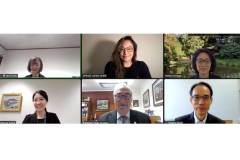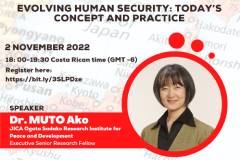Webinar Features the Evolving Concept of Human Security Based on JICA Ogata Research Institute's Key Report 'Human Security Today'
2023.01.20
On Nov. 2, 2022, the Japan Chair at the University for Peace (UPEACE) hosted a webinar titled "Evolving Human Security: Today's Concept and Practice", featuring the guest speaker Muto Ako, an executive senior research fellow at the JICA Ogata Sadako Research Institute for Peace and Development (the JICA Ogata Research Institute).
The webinar began with an opening remark by Francisco Rojas Aravena, rector of UPEACE, who pointed out that in the post-Cold-War era and globalization, the traditional concept of security is insufficient. He said a new concept is necessary to respond to new, non-military threats, including climate change, COVID-19, and the democratic system crisis. He highlighted the combination of such new threats and traditional threats like the economic crisis in the world constitutes a great challenge to academics, politicians, and society with regard to developing new patterns of thought and new paradigms.

The discussion centered around the JICA Ogata Research Institute's Key Report 'Human Security Today'
The presentation of Muto consisted of three parts: the historical development of the concept of human security, human security in practice, and prospects for future human security research based on an article she co-authored, "History of Human Security Research: Efforts by JICA Ogata Sadako Research Institute for Peace and Development" in the first issue of the JICA Ogata Research Institute Report "Human Security Today".
Muto started the presentation by highlighting the importance of a human security perspective as an effective measure to deal with the situation, where traditional concerns such as armed conflicts and natural disasters are becoming more serious and new global challenges such as the COVID-19 pandemic are emerging.
Muto said that the Human Development Report 1994 by the United Nations Development Programme (UNDP) widely introduced the concept of human security at the policy level. Then, after nearly 20 years of debate, the UN General Assembly adopted a resolution on a comprehensive understanding of human security in 2012. The resolution clearly stated that human security does not entail the threat or the use of force or coercive measures and does not replace state security. Today, the resolution is considered as the common understanding of human security in a broad sense in the international community. It proposed that security should be rethought from a human-centered perspective by identifying the wide range of threats, including climate change, natural disasters, infectious diseases, economic crises, discrimination and inequality as well as conflicts.
After presenting the historical development of the human security concept, Muto emphasized the importance of collaborations among various actors across disciplines, professions, and specialties crossing national borders to achieve human security because dealing with a single cause is not sufficient to address cascading and chained threats.
Then, Muto introduced a prevention-oriented perspective to promote human security. For example, while it is difficult to stop the occurrence of natural disasters, it is possible to prepare for and mitigate the anticipated damage. The measures to protect people from the damage of natural disasters, as well as participatory approaches and community awareness, can help empower people.

Executive Senior Research Fellow Muto Ako featured in the event flyer
Another way to achieve human security is to focus on the vulnerable. Poverty, for example, can be seen as a form of want and deprivation. Clarifying the situation of the poor through government and local authorities is fundamental to promoting human security. Moreover, it is possible to curb the deterioration of the situation of the poor not only through direct assistance to the poor but also through cooperation such as disaster risk reduction and the expansion of educational opportunities.
Muto also emphasized the importance of conducting assistance both at the national and community level. According to her, JICA has increased both community and nationwide support, positioning people more directly at the center of cooperation based on the concept of human security. The last point is the significance of collecting and using disaggregated data to understand the situation of people who are vulnerable and left behind, especially at the local level.
Kajino Mayuna, a research officer at the JICA Ogata Research Institute, also took part in the online presentation to share her experience of JICA volunteer activities in Honduras. She explained how to apply the concept of human security in practice in the field and emphasized the concept of human security could help to understand different perspectives and promote collaboration among different actors.
In the last part of her presentation, Muto introduced intergovernmental and other forms of cooperation, permeation, and integration of human security at the local level, and dignity-oriented human security practice as prospects for future human security research based on her co-authored article mentioned above.
To end the presentation, Muto stated that UNDP released a special report, "Emerging Threats to Human Security in the Anthropocene," in February 2022. The fact that both UNDP and JICA released the report about human security almost simultaneously shows the importance of promoting human security in today’s uncertain world.
Following Muto’s presentation, Rojas concluded the webinar. In his statement, he pointed out the recent trend of organized crimes that use child soldiers and emphasized the importance of finding ways to protect children because there is no trial for children.
JICA Ogata Research Institute Report “Human Security Today” (No.1, 2022): Revisiting Human Security

事業事前評価表(地球規模課題対応国際科学技術協力(SATREPS)).国際協力機構 地球環境部 . 防災第一チーム. 1.案件名.国 名: フィリピン共和国.

事業事前評価表(地球規模課題対応国際科学技術協力(SATREPS)).国際協力機構 地球環境部 . 防災第一チーム. 1.案件名.国 名: フィリピン共和国.

事業事前評価表(地球規模課題対応国際科学技術協力(SATREPS)).国際協力機構 地球環境部 . 防災第一チーム. 1.案件名.国 名: フィリピン共和国.

事業事前評価表(地球規模課題対応国際科学技術協力(SATREPS)).国際協力機構 地球環境部 . 防災第一チーム. 1.案件名.国 名: フィリピン共和国.

事業事前評価表(地球規模課題対応国際科学技術協力(SATREPS)).国際協力機構 地球環境部 . 防災第一チーム. 1.案件名.国 名: フィリピン共和国.
scroll